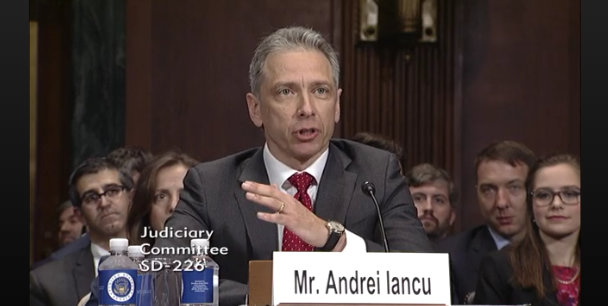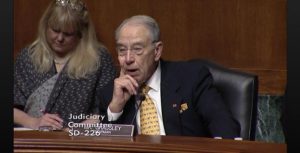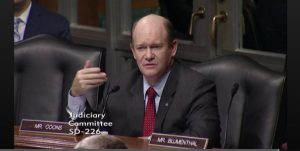On the afternoon of Wednesday, November 29th, the U.S. Senate Committee on the Judiciary held a hearing to consider the nomination of four political appointees from the Trump Administration. Included among the days’ nominees was Andrei Iancu, President Trump’s selection to serve as Under Secretary of Commerce for Intellectual Property and Director of the U.S. Patent and Trademark Office. Though the nomination hearing was brief and Iancu’s remarks were very measured, there would be reason for patent owners to think that a more balanced playing field at the USPTO could start to form should Iancu be confirmed as Director of the agency.
“American intellectual property is exceptional,” began Iancu’s opening remarks to the Senate Judiciary Committee. He noted that inventors like Thomas Alva Edison and the Wright Brothers have become part of our national vernacular and that those working on the forefront of the computer and biotech revolutions have been successful in working within the U.S. intellectual property system. “It is no accident that all of this has happened on American soil within the context of the U.S. Constitution,” Iancu said. “When patent owners and the public have confidence in the patent grant, inventors are encouraged to invent, investments are made, jobs are created.”
In his opening remarks, Iancu referenced a quote found in a letter addressed by Founding Father Thomas Jefferson to British diplomat Benjamin Vaughan in 1790. Jefferson was originally against the implementation of a patent system during the United States’ early days based on his opposition to monopolies. As Iancu noted, Jefferson remarked that “an act of Congress authorising the issuing patents for new discoveries has given a spring to invention beyond my conception” just months after the Patent Act of 1790 was passed.
Iancu’s career prior to his nomination to serve as Director of the USPTO put him on “all sides of disputes” in the intellectual property world and he testified that he has represented both large and small clients in cases. Prior to his legal career, he served as an engineer with Hughes Aircraft. Iancu remarked that his experience has shown him that independent inventors can become industry leaders and that accused infringers in one case may be the plaintiff asserting IP in a different case. “The playing field must be even for all,” Iancu said.
Although the entire Senate Judiciary Committee hearing on President Trump’s recent nominees last three-and-a-half hours, the portion involving the nominee panel including Iancu only lasted 30 minutes. Iancu only faced questions from committee chairman Sen. Chuck Grassley (R-IA) and Sen. Chris Coons (D-DE). Sen. Grassley led off Iancu’s questioning by asking the nominee to identify a few challenges facing the USPTO and which of those would Iancu prioritize if confirmed as Director. Iancu remarked that one of his highest priorities would be to bring reliability and stability to the U.S. patent system specifically and intellectual property in general. Among the areas to look at in this regard include inter partes review (IPR) and post-grant review (PGR) proceedings at the Patent Trial and Appeal Board (PTAB) Iancu said, noting that the office now has “quite a bit of experience since [the America Invents Act (AIA) of 2011] was passed” which can help the USPTO “assess how the system is working.”
Iancu also responded that he would “focus on the overall IP system in the sense that perhaps provides a new paradigm to recognize, champion and evangelize the IP system.” Iancu stated that he wanted to “identify the excitement of invention and the creation of new things” as well as the benefits which intellectual property confers upon an economy.
Sen. Coons spoke to the concerns raised by many stakeholders in the U.S. patent system who feel that the post-issue patent review trials instituted by the AIA is unfair to patent owners, including the use of a different claim construction standard, inability to amend patents and the lack of a standing requirement, among other issues. Sen. Coons asked if Iancu shared those concerns. “I’m very much aware of strident criticisms of some of the proceedings,” Iancu said, noting that some of those strident criticisms were well-founded. “If the inventing community does not have confidence in the IP system, then investments do not get made and inventions slow down,” Iancu said, noting that such a slowdown in inventing would negatively impact the economy.
Sen. Coons next questioned Iancu as to his thoughts on what he called “wandering jurisprudence” issued by the U.S. Supreme Court in terms of patentability under 35 U.S.C. § 101, noting that SCOTUS has called into question whether patents should even be issued in certain technology sectors including computer-implemented methods and medical diagnostics. Although Iancu acknowledged that recent Supreme Court decisions in cases such as Alice Corporation v. CLS Bank International has introduced a level of uncertainty, he said that the USPTO follows current jurisprudence from SCOTUS as the law of the land. He did note that the jurisprudence was fairly recent and is still being interpreted by the lower courts; he also commented that he would make it a priority to issue further guidance to agency members on Section 101 patentability if such guidance seemed proper.
Wrapping his questioning period, Sen. Coons voiced his concerns over a lack of information issuing from the USPTO regarding their use of the Commerce Department’s shared services initiative, having received a letter on the issue from the USPTO the day prior to Iancu’s hearing after Sens. Coons and Grassley first requested that information back in July. Sen. Coons noted that USPTO payments towards the shared services program could carry concerns of “serious potential misuse” as it diverts money collected through patent owner fees which are supposed to be used to fund USPTO activities. Sen. Coons asked Iancu if he would commit to investigating the issue to provide to provide concrete answers to the questions raised in the July letter within one month of his confirmation and if he would inform the Senate Judiciary Committee if he received any political pressure to agree to continue diverting USPTO funds towards the shared services initiative. Iancu committed to investigating; an audio error in the hearing webcast made it difficult to determine his full response to Sen. Coons’ questions here. Iancu did discuss the importance of ensuring that patent fees weren’t being diverted and were being used to the benefit of agency clients.
Sen. Grassley followed Sen. Coons and part of his questions regarded the activities of patent assertion entities (PAEs), which Sen. Grassley equated generally with “patent trolls.” Iancu said that it was important that any abuse of the U.S. patent system shouldn’t be tolerated but that maintaining overall balance in the system was of utmost importance. “We really do have to be careful not to throw out the baby with the bathwater,” he said, noting that recent Congressional actions and Supreme Court decisions have addressed abuses and that he would take stock of whether more action was needed as those recent legal changes are applied.
Sen. Grassley also discussed perceived abuses among stakeholders regarding IPR and PGR proceedings at the PTAB which are taking place to the detriment of patent rights. He asked Iancu if he believed that the AIA was being implemented in a way that fulfilled policy goals set out by Congress. Iancu responded by noting that the Supreme Court had just heard oral arguments Monday in Oil States Energy Services, LLC v. Greene’s Energy Group, LLC, a case looking at the constitutionality of IPR proceedings at the PTAB. Iancu also reiterated issues raised by Sen. Coons regarding claim construction and other aspects of patent trials which face a different standard at the PTAB than in district court; he also identified issues regarding the type of material submitted as evidence in PTAB trials and how consideration to institute an IPR is determined at the top of the proceedings.

![[IPWatchdog Logo]](https://ipwatchdog.com/wp-content/themes/IPWatchdog%20-%202023/assets/images/temp/logo-small@2x.png)




![[Advertisement]](https://ipwatchdog.com/wp-content/uploads/2024/04/UnitedLex-May-2-2024-sidebar-700x500-1.jpg)
![[Advertisement]](https://ipwatchdog.com/wp-content/uploads/2024/04/Artificial-Intelligence-2024-REPLAY-sidebar-700x500-corrected.jpg)
![[Advertisement]](https://ipwatchdog.com/wp-content/uploads/2024/04/Patent-Litigation-Masters-2024-sidebar-700x500-1.jpg)

![[Advertisement]](https://ipwatchdog.com/wp-content/uploads/2021/12/WEBINAR-336-x-280-px.png)
![[Advertisement]](https://ipwatchdog.com/wp-content/uploads/2021/12/2021-Patent-Practice-on-Demand-recorded-Feb-2021-336-x-280.jpg)
![[Advertisement]](https://ipwatchdog.com/wp-content/uploads/2021/12/Ad-4-The-Invent-Patent-System™.png)






Join the Discussion
10 comments so far.
Joachim Martillo
December 7, 2017 11:38 amJohn White@2,
Iancu has no reason to take the job or to stay if he does not receive the power he needs for his goals.
Here is a link to a playlist of Iancu’s segment of the hearing of the Congressional Committee on the Judiciary.
https://www.youtube.com/playlist?list=PL75Byt_iuYqwLm_lQV_OR6q3OOj86rIME
Just click play all.
The Time Is Now To Act
December 1, 2017 12:19 pmJPM- and would add Wilbur Ross to that list. The list of new candidates for Director was world class and discerning the right candidate was difficult during the timeframe given. And, having the existing Director in the mix as a candidate was an addition complicating factor.
JPM
December 1, 2017 10:35 amVery happy to see that Mr. Iancu understands how weak the patent system has become. I feel that the PTAB will be significantly reformed when Mr. Iancu arrives at the PTO. In my opinion, it looks like Trump made the right pick for PTO director.
angry dude
December 1, 2017 10:04 amAnon @5
My message is clear:
Do not file for US patents UNLESS your invention can be reproduced very easily
by copycats (like Tesia’s mechanical zipper which can be reproduced in a matter of hours)
And in that case inventors should think hard if it’s better for them to go fishing instead of doing anything at all
For me – trade secrets on embedded (DSP) software
copyright on the binary too, of course
Infringer’s choices:
crack my binary and use it as it is (criminal copyright violation)
OR
try to decompile and reverse-engineer it – hugely time-consuming and expensive proposition – it would be cheaper to buy it outright
Night Writer
December 1, 2017 08:20 ameBay, Alice, KSR, and IPRs.
Alice is still just unbelievably bad. If take time to understand Alice, you will realize that it is unconstitutional (and probably grounds to impeach the 8 justices.)
But, practically, what Alice does is often force an extra OA, which costs my clients a lot of money.
Anon
December 1, 2017 07:09 amangry dude,
I see that you are still playing the pawn of the Efficient Infringers with your message of “don’t bother, don’t fight.”
Curious
November 30, 2017 06:22 pmThe trust is broken. Amen.
The US Patent System faltered for a very long time. However, it eventually got fixed. This time, it may not get fixed by the time my career is over, but I would never say never. Also, there is always a fresh batch of inventors who get lured by the siren call of a patent but don’t understand all the pitfalls that await them.
angry dude
November 30, 2017 03:44 pmwtf cares anymore ?
it’s too little and waaaay too late
all sensible people with good ideas forgot about the existence of USPTO looong time ago
The trust is broken. Amen.
John White
November 30, 2017 03:34 pmAt least the correct issues were raised for consideration. Hopefully this Director will be vested with the “policy chops” to pull it off. He has the capacity, but whether this administration will provide the leeway is, as yet, an unknown. I hope they do.
The Time Is Now To Act
November 30, 2017 12:50 pmSteven- great writeup. I also thought it notable that Iancu referenced that he is highly interested in sitting in on IPR proceedings as an ALJ. He further notes he will examine the feasibility/desirability of doing so.
He notes ‘which the statute does allow’.
This statement is in stark contrast to Ex-Director Lee’s position; especially when taken in the context of his vocal emphasis when speaking on the issue.
The exercise of playing video of the Lee and Iancu confirmation hearings side by side would be revealing. In my memory, they are night and day.
Thanks also for using the words ‘agency clients’ in the report. Client is a word of honor; whether large or small.